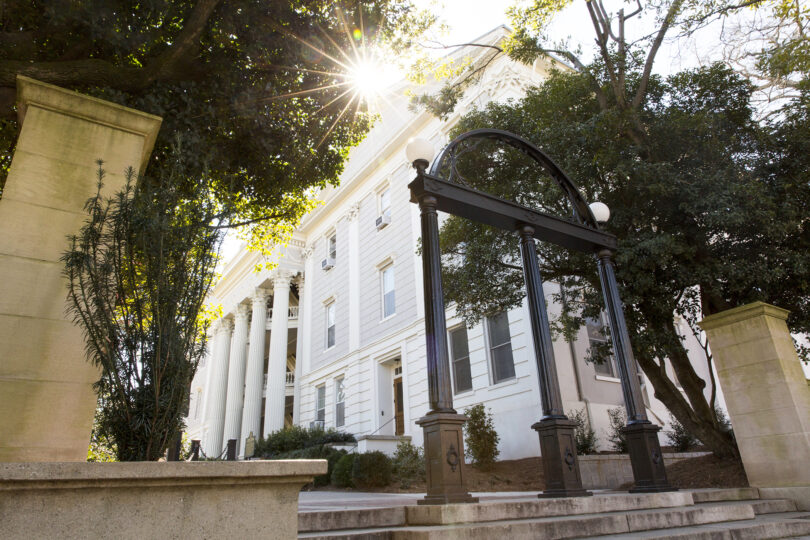The Southern Association of Colleges and Schools Commission on Colleges (SACSCOC) has reaffirmed the University of Georgia’s accreditation, highlighting the university’s commitment to excellence in teaching, research and service.
Accreditation validates that the quality of education and facilities at UGA meets 72 standards set by SACSCOC in coordination with the U.S. Department of Education. Accreditation also ensures UGA is eligible to receive federal and state funding to support student financial aid and to transfer academic credits with other institutions. SACSCOC had zero recommendations regarding UGA’s compliance with the commission’s standards, equating to a perfect score in the intensive reaffirmation process.
“The reaffirmation of our accreditation by SACSCOC reflects the University of Georgia’s longstanding commitment to academic excellence and our unwavering focus on student success,” said President Jere W. Morehead. “I extend my deepest thanks to the many faculty, staff, and students across our campus who worked so hard over the last two years to help our university secure this major accomplishment.”
UGA submitted a lengthy compliance certification report in September 2021 to demonstrate the institution’s compliance with SACSCOC standards, kicking off a three-stage review process. For the second step, universities must submit a quality enhancement plan (QEP) to improve student learning and success. UGA’s quality enhancement plan is focused on fostering a culture of active learning. Faculty, staff and students from across campus have contributed to developing the plan over the last two years.
Active learning is designed to make students active participants in the classroom and to help instructors guide students to construct knowledge while actively reflecting on the process of learning. In practice, active learning can include in-class problem solving, group work, individual writing and reflection, or a number of other strategies.
Promoting active learning was a key recommendation of the university’s 2017 Task Force on Student Learning and Success, and Morehead allocated $1 million in classroom renovation funds based on the task force report. With these resources, numerous classrooms across campus have been refitted with technology and moveable furniture to facilitate group work and make it easier for the instructor to move among the students.
The active learning QEP will add to these initial investments, creating additional instructor development programming, initiatives to help students succeed in active learning classes, and funding for classroom renovations. The university and the UGA Foundation together have dedicated $1.2 million per year for the next five years in support of the QEP.
“Our active learning initiative promises to have a transformative impact on teaching and learning at the University of Georgia,” Morehead said. “Hundreds of academic leaders, faculty, staff and students have devoted their energy and insight to bring the QEP to life, and I am confident it will take the learning environment at UGA to even higher levels of excellence.”
The third step in the reaffirmation process was an on-site visit by an accrediting team to ensure UGA has the resources, programs and services to accomplish and sustain its educational mission. The team also examined whether UGA’s educational objectives are consistent with its mission and appropriate to the degrees it offers.
The 10-member review committee visited UGA March 28-31. Chaired by Maurice Eftink, associate provost emeritus and professor emeritus of chemistry and biochemistry at the University of Mississippi, the team included University of North Carolina at Chapel Hill Chancellor Kevin M. Guskiewicz and Florida International University Interim President Kenneth A. Jessell. In addition to meeting with Morehead and other members of the university’s leadership team, the review committee met with groups of faculty, staff, and students on the Athens campus as well as the UGA campuses in Tifton and Buckhead.
“To complete a reaffirmation with zero recommendations is a sign of sustained levels of excellence by our faculty, staff and academic leaders across all areas of the campus,” said Meg Amstutz, dean of the Morehead Honors College and UGA’s SACSCOC liaison. “Every day, people across the institution seek to ensure we are fulfilling our missions in instruction, research, and public service and outreach. Our shared commitment to student success across all units was evident to the review team.”
The Office of Accreditation and Institutional Effectiveness played a critical role in making sure UGA’s report to SACSCOC reflected the high levels of innovation and achievement on campus, Amstutz said.
UGA’s next reaffirmation of accreditation will take place in 2031–32. In the meantime, SACSCOC requires the university to submit an interim report in 2028. The report will include an abbreviated compliance certification and an impact report on the quality enhancement plan.







